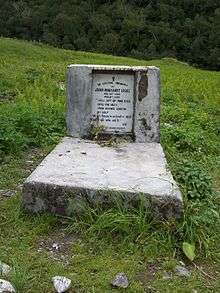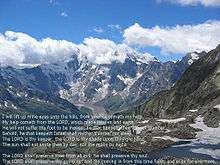Psalm 121

Psalm 121 (Greek numbering: Psalm 120) is the 121st psalm from the Book of Psalms. It is one of 15 psalms categorized as "A song of ascents" (Shir Hama'alot), although unlike the others, it begins, Shir LaMa'alot ("A song to the ascents").
Uses
Biblical uses
As a song of ascent it is recognized that this psalm was sung by pilgrims on their way to Jerusalem. At the beginning of the pilgrimage, in the mountainous region of the Judean Hills, the pilgrim makes sure the Lord's help. The one who trusts in the Lord is certain that He will bring him protection day and night. Prayer moves from the first to the second person in verse 3, and even takes the form of a blessing in verses 7 and 8. This will conclude the prayer of different singers by the prospect of change.
Judaism
- Is recited following Mincha between Sukkot and Shabbat Hagadol.[1]
- Verse 4 is part of the prayers of the Bedtime Shema.[2]
- Verse 7 is part of the blessing given by the kohein at a pidyon haben ceremony.[3]
- Verse 8 is part of the prayers of the Bedtime Shema.[4]
Protestant Christianity
Psalm 121 has the Latin incipit, Levavi oculus. In the Anglican Book of Common Prayer, it is prescribed for use on day 27 of each month, at Morning Prayer.[5] The first verse is frequently quoted on monuments and memorials commemorating those inspired by mountains or hills. A well known example is a stained glass window in Church of St Olaf, Wasdale in the English Lake District National Park, which quotes Psalm 121 as a memorial to members of the Fell & Rock Climbing Club who were killed in the First World War.[6] Spurgeon called it a soldier's song as well as a traveller's hymn[7] while Livingstone read the Psalm with his family dockside on his leaving for Africa.[8]
Catholic Use

Around 530, St. Benedict of Nursia chose this Psalm for the third office during the week, specifically from Tuesday until Saturday between Psalm 120 (119) and Psalm 122 (121). Indeed, attributing Psalm 119 (118), whichever is longer, to the services on Sunday and Monday, he structured offices of the week with nine suivants[9] psalms.
In the Liturgy of Hours today, Psalm 121 is recited Vespers Friday of the second semaine6. In the liturgy of the Word, it took the 29th Sunday in Ordinary Time, year C. It is during this period that the Church prays for refugees.[10]
Text
|
|
Musical settings
Musical settings for the Latin text have been composed by Orlando di Lasso, Hans Leo Hassler, and Herbert Howells amongst others. Settings composed for the English text include John Clarke-Whitfeld, Charles Villiers Stanford and Henry Walford Davies.[12] Felix Mendelssohn composed the famous Hebe deine Auge auf (looks up), which was originally a trio oratorio Elias (op. 70, 1846). Heinrich Schütz created a version for four voices and basso continuo (SWV 31). A setting by William McKie was sung at the funeral of Queen Elizabeth The Queen Mother in 2002.[13]
Israeli Hasidic singer-songwriter Yosef Karduner composed a popular Hebrew version of Psalm 121, Shir LaMa'alot (2000), which has been covered by many Israeli artists[14] and is a staple amongst synagogue youth groups in Israel and Canada.[15]
Czech composer Antonín Dvořák set verses 1-4 to music in his Biblical Songs (1894).
References
- ↑ The Complete Artscroll Siddur page 530
- ↑ The Complete Artscroll Siddur page 295
- ↑ The Complete Artscroll Siddur page 221
- ↑ The Complete Artscroll Siddur page 293
- 1 2 "The Book of Common Prayer - THE PSALMS OF DAVID - Day 27. Morning Prayer". churchofengland.org. The Archbishops' Council. Retrieved 27 September 2014.
- ↑ "Wasdale – St Olaf's Church". visitcumbria.com. Visit Cumbria. Retrieved 29 September 2014.
- ↑ Psalm 121 @spurgons commmentary.
- ↑ http://www.preceptaustin.org/psalm_121_a_commentary.htm
- ↑ Règle de saint Benoît, traduction par Prosper Guéranger, (Abbaye Saint-Pierre de Solesmes, 2007), p46.
- ↑ Le cycle principal des prières liturgiques se déroule sur quatre semaines.
- ↑ "Latin Vulgate (Clementine) - Book Of Psalms - Psalm 120". drbo.org. Retrieved 27 September 2014.
- ↑ "Psalm 121". 1.cpdl.org. Choral Public Domain Library. Retrieved 27 September 2014.
- ↑ "Funeral of Queen Elizabeth, the Queen Mother: Full text of the service held at Westminster Abbey". theguardian.com. Guardian News and Media Limited. 9 April 2002.
- ↑ "קרדונר מעדיף שיר מורכב - ודיבור פשוט" [Karduner Prefers a Complex Song – "Simple Talk"]. Ynetnews (in Hebrew). 30 October 2012. Retrieved 31 October 2015.
- ↑ Rotem, Tal (28 July 2008). "Breslev's Sweet Singer". breslev.co.il. Retrieved 31 October 2015.
External links
| Wikimedia Commons has media related to Psalm 121. |
